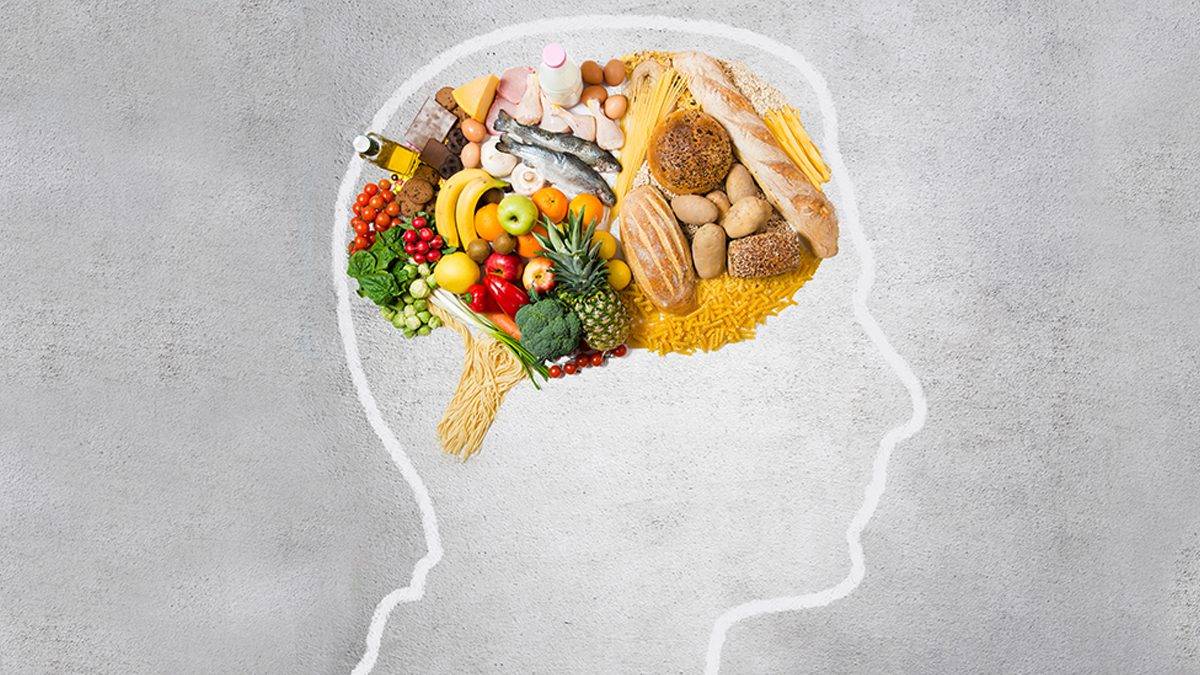The Food-Mood-addiction Connection Between What You Eat & What Eats at You
You may already know that your brain and body partner up when it comes to deciding what and how you eat. One is constantly signaling the other to communicate information about how hungry or full you are, how much you’re eating, and whether you feel like having a green smoothie or a slice of pizza. At the same time, eating different types of foods causes different types of signals to be sent back and forth between your brain and your body.
Susan McQuillan, M.S., RDN, is a food, health, and lifestyle writer in New York City. She received her Bachelor’s degree from New York University and her Master’s degree from Hunter College. She is a former senior editor at Reader’s Digest General Books Division and American Health magazine.
Editor: Saad Shaheed
Your brain, specifically your hypothalamus, is your body’s food control center. Hunger and fullness are registered here, appetite is controlled, and metabolism is guided by billions of neurons (brain cells). Your neurons communicate with each other by sending messages about your moods, emotions, and feelings, as well as physical hunger. Chemicals are called neurotransmitters to carry these messages from one neuron to another and throughout your body.
Have you ever noticed that certain foods seem to throw you into different kinds of moods? That’s because what you eat affects the balance of some of the neurotransmitters, such as serotonin and dopamine, that play a role in mood and appetite control. In turn, the balance of these neurotransmitters can affect the way you feel. Low levels of serotonin in the brain are associated with both depression and anger. When the brain needs serotonin, some people “self-medicate” with starchy carbohydrates such as crackers, bread, and cake, because these carbs provide the brain with the raw materials it needs to synthesize and release serotonin. At the same time, foods that are rich in antioxidants and vitamins, such as fresh fruits and vegetables, have been found to help boost levels of tryptophan, one of the raw materials that increase serotonin production.
It happens the other way around, too. Certain moods might affect the type of food you choose to eat. Many people say they crave starchy carbohydrates or carb-fat combos when they feel anxious, and that eating these foods makes them feel calmer. When you are feeling nostalgic, or in need of nurturing, you may choose to eat a favorite comfort food from your childhood.
Other chemicals in your brain and throughout your body influence when you eat, the types of foods you eat, how much you eat, and whether you’re even hungry, and they all ultimately affect your mood. Endorphins, for instance, are those feel-good chemicals that are naturally produced by your body to help you cope with stress and pain. Chocolate, ice cream, and other sweet and creamy foods appear to trigger the release of endorphins, and that’s why some people think of these as comfort foods or mood elevators. In turn, endorphins are thought to trigger cravings for these very same foods. That’s one reason why it might not be such a good idea for some people to give in to cravings for these foods or use them as mood soothers. You might not be able to stop eating!
While carbs are calming, high protein foods like meat, poultry, and lean fish help boost the production of neurotransmitters that increase alertness. So if you’re looking for more mental energy, it might help to eat a high protein, low-carb meal. If you’re looking to calm your mind, you may want more carbs combined with proteins like salmon and other fatty fish that are rich in omega-3 fatty acids, which may also ease symptoms of depression.
Some people feel that they are addicted to specific types of foods—usually carbs and often specifically to sugar—to the degree that once they start eating, they cannot stop. The key neurotransmitter involved in addictive behavior is dopamine and, years ago, researchers found that, in the brains of some obese people, sugar provokes the same dopamine response as cocaine. More recently, however, researchers have questioned whether it is an addiction to specific foods that underlies some forms of obesity or other activities facilitated by the dopamine that affect an individual’s relationship with food and cause some people to lose control over the amount they eat. It’s possible, the researchers suggest, that what looks like an addiction to specific foods is actually an addiction to eating. In that case, avoiding “addictive” foods would not be the solution so much as avoiding certain behaviors.
Much is still unknown, but one thing is for sure: Both skipping meals and overeating are habits that send your brain chemicals and body hormones into a tailspin and, one way or another, can ultimately cause you to overeat and even binge. You can add that to a growing list of reasons for routinely eating regularly scheduled and nutritionally balanced meals and snacks that include a variety of foods to maintain good mental and physical health.

